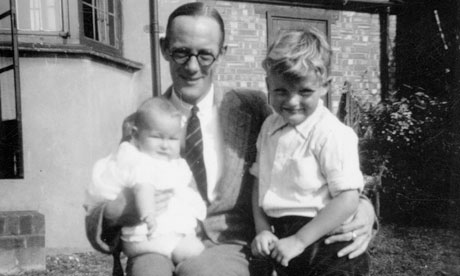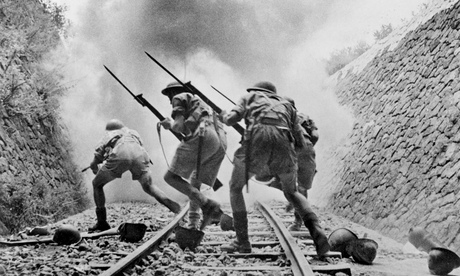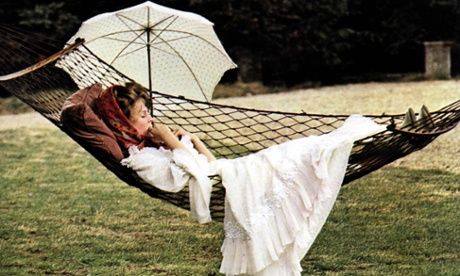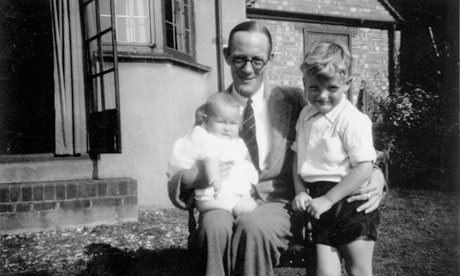The concept of father memoirs is a fascinating one. Confronting fathers directly and publicly is not, and never has been, easy: the patriarch should judge and not be judged. To write about the father is to sit in judgment upon him, and for most cultures this was a taboo too strong to be overcome. The Greeks, despite their searingly perceptive stories about father-child interactions, did not attempt to do so – nor did the Romans, the Italians of the Renaissance, the Elizabethans or even the Romantics. Paradoxically – but not surprisingly, given the rigid paternalism of the age and the attendant psychological pressures – personal father writing, like radical feminism, is a product of the Victorian era.
In 1907, six years after the death of Queen Victoria, Edmund Gosse published Father and Son. Once the taboo was broken, writers were quick to take advantage of the new possibilities. The 20th century saw a steady increase in the number of father memoirs and, now that the boomers are ageing and seeking to immortalise themselves, such memoirs are becoming as ubiquitous as tattoos. As with tattoos, some are visceral works of art. The 10 books described below give an idea of how poignant, rich and rewarding father memoirs can be.
1: Father and Son by Edmund Gosse
The first of all father memoirs, this is still one of the best. Interestingly, Gosse's first attempt to write about his father took the form of an official biography. Written shortly after his father's death on 23 August 1888, The Life of Philip Henry Gosse was admired by Henry James as "a singularly clever, skilful, vivid, well-done biography of his father, the fanatic and naturalist – very happy in proportion, tact and talent". Luckily, at least two other readers – John Addington Symonds and George Moore – suggested that Gosse should be more autobiographical and explore the father-son relationship.
Almost 20 years later, Gosse unburdened himself of Father and Son. Though the book was an immediate success and the reviews were largely enthusiastic, the reviewer of the Academy had reservations about the "close anatomisation by a son of a father", and the Times Literary Supplement raised the question of "how far in the interests of popular edification or amusement it is legitimate to expose the weaknesses and inconsistencies of a good man who is also one's father". Perhaps not always fortunately, subsequent writers, far more frank and confessional, showed far fewer qualms in writing about their fathers.
2: Fun Home, by Alison Bechdel
As Art Spiegelman proved with Maus, father memoirs can take graphic narrative form. Courageously original and lovingly honest, Fun Home is a coming-of-age story – a story of lesbian self-discovery – which also outs the father posthumously as a closeted gay man and a possible suicide. In intertwining her father's story with her own, Bechdel is conscious of being as ruthless as her father was in "his monomaniacal restoration of our old house". She, too, is a Daedalus, who answers "not to the laws of society, but to those of [her] craft".
Profoundly personal, Fun Home is also mythic. From the opening page onwards, it is a rich affirmation of Stephen Dedalus's closing words in A Portrait of the Artist As a Young Man: "Welcome, O life, I go to encounter for the millionth time the reality of experience and to forge in the smithy of my soul the uncreated conscience of my race. Old father, old artificer, stand me now and ever in good stead." This affirmation is triumphantly validated by "the tricky reverse narration" of Fun Home's final panels, in which Bechdel's artistically resurrected, epic father is there to catch and save her child self.
3: The Shadow Man: A Daughter's Search for Her Father, by Mary Gordon
Mary Gordon sketches a passionate portrait of a deeply flawed man, a shabby pornographer with literary pretensions, a convert to Christianity who was so ashamed of his immigrant and Jewish origins that he hid his past and became a nasty antisemite and a writer of speeches for Joe McCarthy. In the course of investigating her father's life and of reflecting on the motives for her search, she also had his bones dug up and reburied.
The intensity of her obsession with her father, who died when she was only seven, is terrifying – yet readily understandable. The father of her childhood, after all, was not a real human being. He was a fairytale father, an Angela Carter father, a "magic uncle", a Pied Piper strewing candy and trailing kids. In trying to find her "real" father, in trying to come to terms with the lies her father told her, Gordon confesses: "I have done things to my father. I have remembered him, researched him, investigated him, exposed him, invented him." The one thing she cannot do is exorcise him.
Gordon is a spiritual sister to Sylvia Plath – who lost her father when she was eight – and despite her ironies, her literary inventiveness, her distancing techniques, she cannot escape the curse of victimhood her father's early death bequeathed her.
4: There is a Season, by Patrick Lane
"I circle my father's death for a means to get close. I remember my Uncle Jack pushing my head into my father's coffin. The taste of lipstick and powder will stay on my lips for ever. Kiss him, he cried, Kiss your father goodbye." There is a cruel courage in how Patrick Lane dwells on the memory of his murdered father and voices pain and grief. In the breathtaking, breath-giving tradition of Derek Jarman's Modern Nature, There Is a Season turns to nature and gardens for healing from the hurtful, painful wonder of life. With this fierce book, Lane, fulfilling a promise he made in an early father poem, Fathers and Sons, reaches "down into the heavy earth" and sings his father "back into the day", and himself free of the poisons of drugs and alcohol. There Is a Season is a lyrical masterpiece to be treasured by all recovering alcoholics, avid gardeners and lovers of Annie Dillard and Thoreau.
5: Patrimony: A True Story, by Philip Roth
While Patrimony's title hints at a postmodern game, there is nothing playful about the clear-eyed, plain-spoken integrity with which Philip Roth observes his father's dying and remembers his father's life. The father lives on in the "modest no-frills style", and the book is remarkable as a strong tribute paid by a strong son to a strong father.
Despite simplicity of style, Patrimony is an epic, with Roth as a Hercules labouring on his father's behalf. In fierce, moving, often comic vignettes he takes on a ghoulish, hate-filled neighbour, a psychotic cab driver, denial of antisemitism by Metropolitan Life, a pornographic Holocaust survivor, a quintuple bypass, his father's shit, and, repeatedly, his father himself. In a previous book, The Facts: A Novelist's Autobiography, Roth had said of his father that "narrative is the form his knowledge takes". In Patrimony, he links his father's narrative gifts to memory: "You mustn't forget anything – that's the inscription on his coat of arms. To be alive, to him, is to be made of memory – to him if a man's not made of memory, he's made of nothing."
Memory and narrative, along with the shit of "nothing less or more than lived reality", are Roth's patrimony – a patrimony he transmutes into this profound and heartfelt testament. Book, son and father merge into "the vernacular, unpoetic and expressive and pointblank, with all the vernacular's glaring limitations, and all its durable force".
6: Swing Low: A Life, by Miriam Toews
Many father memoirs are remarkable for their inventive excellence, but few are as original and as powerful as Swing Low. Miriam Toews imagines herself into her father's head, and brings him back to life as a narrative "I". Her imaginative accomplishment is all the more remarkable in that her father had bipolar disorder throughout his life, and eventually his depression became so deep and his mind so confused that he killed himself by stepping in front of a train.
Such a story would be horrific and depressing if it weren't for the calmness of the narrative voice. Toews's father was a Mennonite living and teaching in a small Manitoba town, and in her rendering of his interior life Toews also explores the tensions between self and community and teases out "the complicated kindness" that makes those tensions almost bearable. Despite the father's mental illness and suicide, Swing Low is a wonderfully sane and life-affirming book.
7: The Duke of Deception, by Geoffrey Wolff
"My father was a bullshit artist." Geoffrey Wolff's book about his scapegrace, conman father suggests you don't have to be a good father to have successful children; some children succeed despite their fathers. Wolff and his brother, Tobias, the author of This Boy's Life, are proof of that – as are, say, Winston Churchill or Michael and Christopher Ondaatje, three other highly successful men who have written wonderfully well about damaged, damaging fathers.
Father memoirs or essays sometimes provide the means for children to come to terms with negligent or destructive fathers. One strength of The Duke of Deception is the relish with which Wolff describes his father's failings. Wolff almost seems to take pride in the fact that his father was "lavish with money, others' money", and that he "was a lie, through and through". Yet there is nothing sentimental, mean or vindictive in Wolff's portrait of his father. In trying to make sense of his father and of himself, Wolff constantly tries to distinguish between "what we feel and what we should feel". The result is unflinchingly honest – a ruefully frank, loving testament and a brilliant book.
8: My Father's Fortune: A Life, by Michael Frayn
There are many kinds of father memoirs. Some are bitter and vindictive. Others are exercises in detection. Still others are meditations on disease or death. My Father's Fortune belongs to two further categories, the tribute patremoir and the sociological. Its closest peers, perhaps, are Doris Lessing's Alfred and Emily and Alan Bennett's study of his father in Untold Stories. Like Lessing and Bennett, Frayn uses his father to study the impact of class, community and historical accident on a life. Through his father he vividly resurrects his East Ewell, Surrey, neighbourhood, along with the struggles and aspirations of London's citizens, both during the second world war and after. Like Bennett, too, he uses gentle humour to bring his father to life again, though where Bennett's father is defined by "my suit" and "my other suit", Frayn links his father to a black homburg, "the last homburg in south-east London, perhaps in western Europe". Beautifully written, a generous, loving tribute to a plucky father and the gritty world that shaped him, My Father's Fortune begins and ends with the father's smile.
9: My Two Wars, by Moritz Thomsen
Moritz Thomsen starts his book by saying: "This is a book about my involvement with two outrageous catastrophes – the second world war and my father." Had he limited himself to the second world war, he might well have produced a brilliant book. His account of flying B-17 sorties from a base near Cambridge is riveting, filled with "the normal self-loathing of a bombardier", and conjuring up a harrowing Hieronymus Bosch world in which "we were as sacred, as moral, as marvellous, as necessary to Earth's intentions as ants". It is the claustrophobic, nightmare world of Randall Jarrell's ball turret gunner.
Where the book breaks down is in its handling of the father. The best patremoirs are difficult journeys of self-discovery, as much about the writer as the father. Even if you are a good writer, it takes perspective, if not maturity, to write well about your father; and for every good patremoir, there are dozens of bad ones, books that are only published because of topical or sensational secondary material – incest or Alzheimer's are popular subjects – or because the parent is a celebrity. My Two Wars is much better than such books, yet it is too angry and raw to achieve its full promise. Top 10 lists are arbitrary things, and this book is on my list because of what it might have been, rather than because of what it is.
10: The Measure of a Man: the Story of a Father, a Son and a Suit, by JJ Lee
JJ Lee's book is fashioned with wisdom and restraint. Like the violin in Thomas Hardy's To My Father's Violin, Lee's father's suit functions as an object on which to hang emotions. It provides depth and distance. Lee skilfully uses the history of suits, and his own attempts at tailoring, to show how we construct ourselves, how we fashion ourselves as men. Like James Baldwin or Raymond Carver, he is writing about a failed father, and emotional distance is necessary to guard against anger or destructive bitterness.
Part of the pleasure of this book is that tailoring is for Lee what whaling was for Melville, and as the patremoir progresses Lee's suit becomes charged with almost as much symbolism as the white of the whale. Even if Lee shows the slow and painful disintegration of his father, the ravages of alcohol, the consequent damage inflicted on wife and children, there is no bleakness or self-pity in the telling. Even if Lee's 89-year-old mentor and father surrogate was forced into tailoring by racism, and even if the Chinamen's cemetery in Montreal was "the place to bury the people no one really wanted around", the focus of this book is not racism. This is a story about self-fashioning, about taking what you have been given, or have been left, and making the best of it.
Andre Gerard is the founder of Patremoir Press and the editor of Fathers: a Literary Anthology










